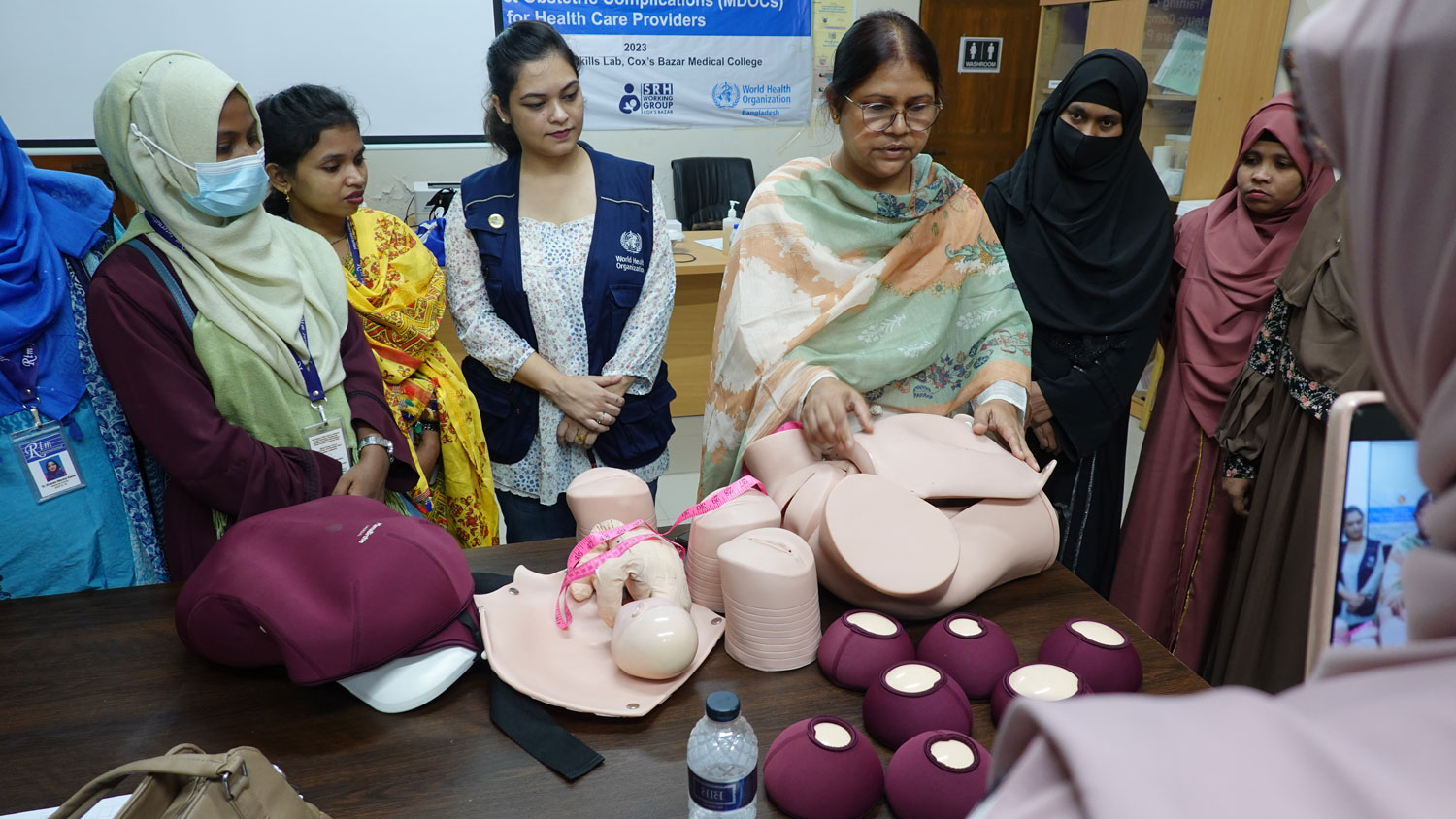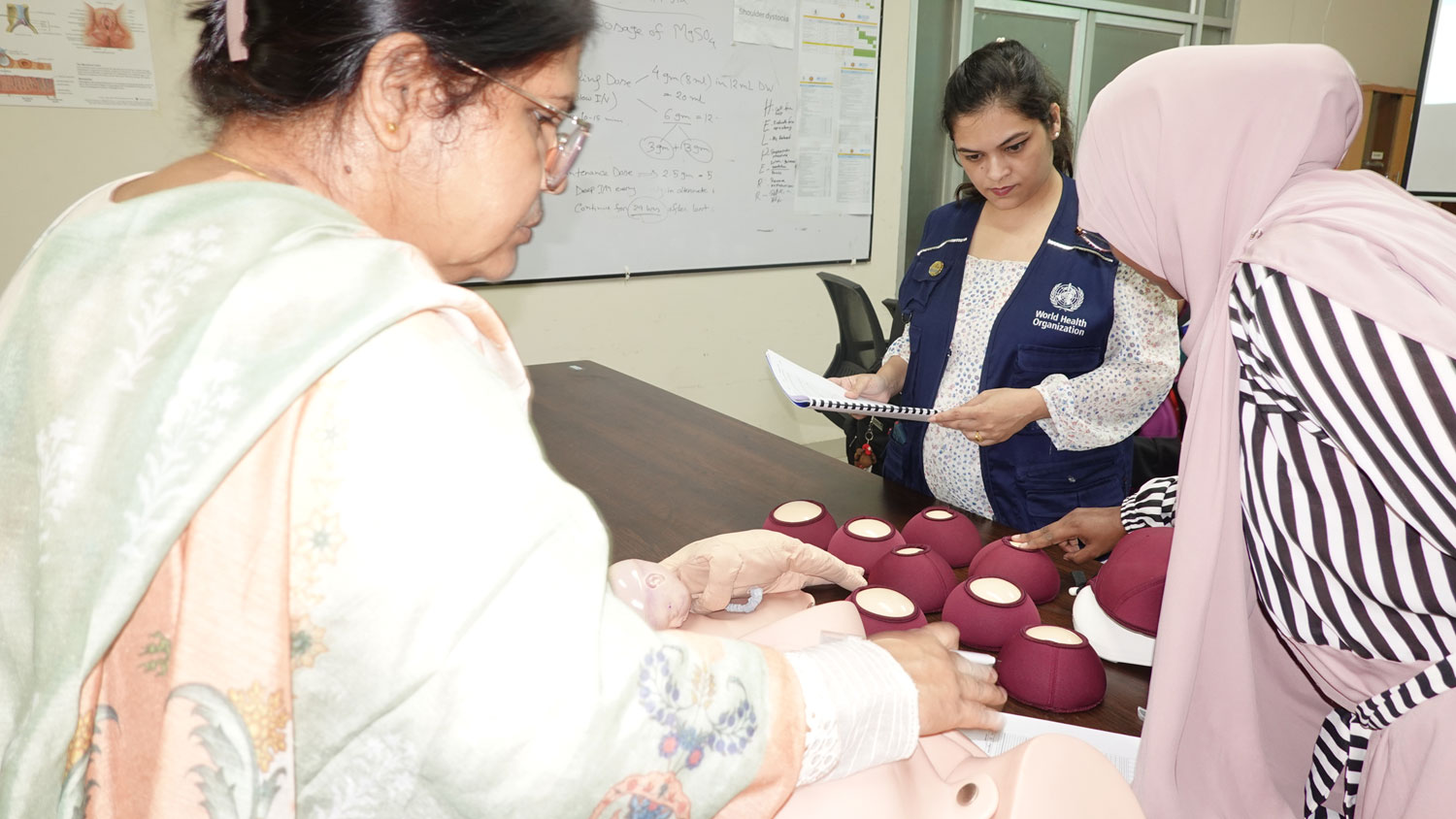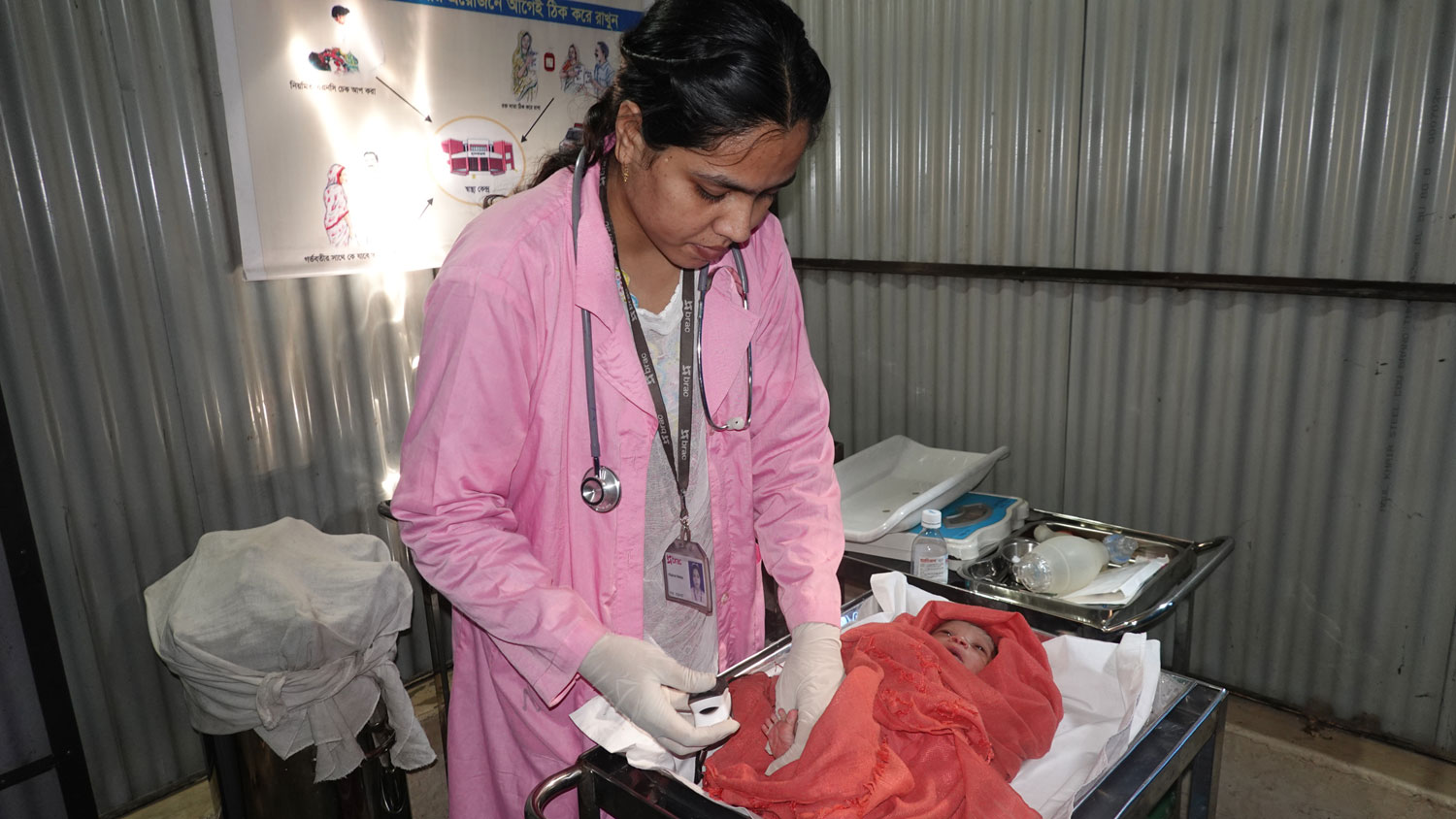“The training was highly interactive and engaging! It was a very amazing hands-on learning experience, translating knowledge into practice. I learned a lot from the instructors and my peers. I feel more confident and skilled in providing quality care to the mothers and babies in my facility”- Khairun Nessa, a 25-year-old midwife who works at one of the health facilities in the Rohingya refugee camps, was thrilled with the training she received at the Cox’s Bazar Medical College’s multi-disciplinary skills lab. The training, supported by the World Health Organization (WHO), aimed to improve participants' knowledge of how to resuscitate newborns and provide immediate postnatal care.

Healthcare workers get practical training on ANC and continuum of care for positive maternal experience at the Medical College.
Photo Credit: WHO/Terence Ngwabe Che
The health system in Cox’s Bazar is overwhelmed by a massive influx of more than 700,000 Rohingyas in 2017. Cox’s Bazar currently hosts about 961,729 Rohingya displaced population who live in cramped camps and settlements in Ukhiya & Teknaf upazilas. The refugees and the local communities have huge health needs, especially for pregnant women and their newborns.
According to the Maternal and Perinatal Mortality Surveillance and Response (MPMSR) report, pregnancy-related causes accounted for 30% of all deaths among Women of Reproductive Age (WRA) in 2022, while neonatal deaths and stillbirths accounted for 11% and 10% respectively. The situation deteriorated further in 2023, as maternal deaths made up 27% of all WRA deaths (16 out of 61) just 10 weeks before WHO started the capacity-building training. The shocking numbers prompted a call for urgent actions from health sector partners to improve the quality of Reproductive, Maternal, Newborn, Child and Adolescent Health (RMNCAH) services in the district under the Sexual and Reproductive Health (SRH) working

Health Care Workers taking practical hands-on training.
Photo Credit: WHO/Terence Ngwabe Che
WHO has been working to address this challenge by implementing a comprehensive RMNCAH strategy that follows the continuum of care concept and covers all interventions from community to facility level. The strategy aims to improve the health outcomes of women, children, and adolescents by adopting the strategic lifecycle approach. One of the key elements of the strategy is to improve the clinical skills of health service providers in managing major direct obstetric complications such as bleeding before, during and after delivery, high blood pressure and related disorders, obstructed labour and peripartum infection, along with new-born resuscitation and postnatal care of mother and baby.
Dr Shapla Khatun, a 28-year-old medical doctor working in a primary health care centre, expressed her gratitude to WHO for giving her the chance to improve her clinical skills in managing obstetric and newborn emergencies. She said that she has seen a significant improvement in the outcomes of her patients. “Since I completed the training, I have handled five complicated deliveries here so far. Before, I used to send such cases to other facilities, but now I can deal with them with ease,” she said.
The multi-disciplinary skills laboratory is a practical training hub that teaches clinical procedures through a structured and supervised teaching concept. The trainees learn and practice the targeted skills in a safe environment until they reach the required minimum standard for patient treatment. The training also includes a rigorous evaluation process that tests the knowledge and skills of the trainees before and after the training and through an Objective Structured Clinical Examination (OSCE).
The training has improved the competency and confidence of the participants, who can now provide quality and comprehensive care to mothers and newborns using the available resources and skills within their facilities. It has also lowered the rate of unnecessary referrals by ensuring the utilisation of the existing resources and managing complicated cases within the respective health facilities. “We are honoured to collaborate with the World Health Organization (WHO) to set up the first multi-disciplinary skills lab in Cox’s Bazar. The skills lab has enabled WHO to organise clinical skills-based, hands-on training programs that have improved the knowledge of our trainers on WHO and national guidelines and recommendations. This has also helped our students and healthcare workers to enhance their practical knowledge and skills to manage obstetric and newborn complications in Cox’s Bazar and Rohingya camps. Furthermore, the RMNCAH clinical skills training materials provided by WHO have boosted our capacity as a teaching institution for communities in Cox’s Bazar. We hope to upgrade our skills lab to a centre of excellence in future with the support of WHO,” said Professor Dr Md. Farhad Hussain, Principal of Cox’s Bazar Medical College and Chairperson of the Skills Lab Management and Coordination Committee (SLMCC).
WHO has been training health workers from both the refugee and host communities using the multi-disciplinary skills lab situated at the Cox’s Bazar Medical College. The participants are responsible for rolling out the skills and knowledge gained from the training sessions among their co-workers. Taking this forward, WHO also continues to measure the impact through post-training follow-up and mentoring visits at the field level targeting all the health care workers who received the training. The data and feedback from the participants during the post-training follow-up visits, as well as the success stories of saving the lives of mothers and newborns shared by the health workers, show the impact of the training.
“The Rohingya crisis has posed a huge challenge for the health system in Cox’s Bazar, especially for the RMNCAH services. WHO has been working closely with the government and other partners to complement the implementation of a comprehensive RMNCAH strategy that covers all aspects of the continuum of care. One of the key components of this strategy is to improve the clinical skills of the health workers through the multi-disciplinary skills lab training. The training has shown remarkable results in improving the quality and outcome of RMNCAH services in the district. We are proud of the achievements of the healthcare workers who have participated in the training and are contributing to saving the lives of mothers and newborns,” Dr Jorge Martinez, Head of WHO Sub office Cox’s Bazar.

Dr Nessa assesses the health and well-being of a newborn baby at the RTMI-UNICEF PHCC in Camp 1W, Rohingya camps, October 2023.
Photo Credit: WHO /Terence Ngwabe Che
WHO will continue to support and supplement the ongoing RMNCAH services in Cox’s Bazar by strengthening the capacity of healthcare workers through the Skills Lab to reinforce the efforts of the government towards ending preventable maternal and perinatal deaths in the Cox’s Bazar district.For more information on this publication, please email Terence Ngwabe Che, External Communications Officer at WHO Cox’s Bazar Office, Bangladesh, at chet@who.int
